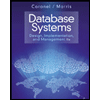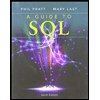
Concept explainers
Aggregate Functions:
SQL has some built-in functions and they are called as aggregate functions. SQL contains five built-in functions. They are:
- SUM – This function is used to add values from the particular column.
- Syntax: SELECT SUM(column_Name) FROM table_Name;
- COUNT – This is used to count the number of rows for the particular column.
- Syntax: SELECT COUNT(column_Name) FROM table_Name;
- MAX – This function is used to get the maximum value from the column.
- Syntax: SELECT MAX(column_Name) FROM table_Name;
- MIN – This function is used to get the minimum value from the column.
- Syntax: SELECT MIN(column_Name) FROM table_Name;
- AVG – This function is used to get the average of all the values from the column.
- Syntax: SELECT AVG(column_Name) FROM table_Name;
“ORDER BY” Clause:
SQL contains “ORDER BY” clause in order to sort rows. The values get sorted in ascending and descending order. The keyword used to sort values in ascending order is “ASC” and for descending order is “DESC”. By default, it sorts values by ascending order.
Syntax:
SELECT column_Name1, column_Name2 FROM table_Name ORDER BY column_Name2;
Join:
Join is a relational operation, which combines the data from two or more tablesinto single table or view, then that is called as Join.
Inner join:
The “inner join” keyword is to select the matching records from two tables. The syntax of “inner join” is as follows:
Syntax:
SELECT column_name FROM table1 INNER JOIN table2 ON table1.column_name=table2.column_name;
“AND” operator:
The operator used to check two or more conditions using single query. The “AND” operator returns “true” when two conditions are satisfied in the query.
“UNION” operator:
The UNION set operator is used to combine the output of two or more than two queries and produce a result. The produced result contains unique values.
Syntax: QUERY UNION QUERY;
“NOT IN” operator:
The “NOT IN” operator used to select not matching rows from appropriate tables.
Syntax: SELECT column_name1, column_name2, column_nameN FROM table_name WHERE column_name1 NOT IN column_name2;
Trending nowThis is a popular solution!

Chapter 7 Solutions
Bundle: Database Systems: Design, Implementation, & Management, 13th + Mindtap Mis, 1 Term (6 Months) Printed Access Card
- 2:21 m Ο 21% AlmaNet WE ARE HIRING Experienced Freshers Salesforce Platform Developer APPLY NOW SEND YOUR CV: Email: hr.almanet@gmail.com Contact: +91 6264643660 Visit: www.almanet.in Locations: India, USA, UK, Vietnam (Remote & Hybrid Options Available)arrow_forwardProvide a detailed explanation of the architecture on the diagramarrow_forwardhello please explain the architecture in the diagram below. thanks youarrow_forward
- Complete the JavaScript function addPixels () to calculate the sum of pixelAmount and the given element's cssProperty value, and return the new "px" value. Ex: If helloElem's width is 150px, then calling addPixels (hello Elem, "width", 50) should return 150px + 50px = "200px". SHOW EXPECTED HTML JavaScript 1 function addPixels (element, cssProperty, pixelAmount) { 2 3 /* Your solution goes here *1 4 } 5 6 const helloElem = document.querySelector("# helloMessage"); 7 const newVal = addPixels (helloElem, "width", 50); 8 helloElem.style.setProperty("width", newVal); [arrow_forwardSolve in MATLABarrow_forwardHello please look at the attached picture. I need an detailed explanation of the architecturearrow_forward
- Information Security Risk and Vulnerability Assessment 1- Which TCP/IP protocol is used to convert the IP address to the Mac address? Explain 2-What popular switch feature allows you to create communication boundaries between systems connected to the switch3- what types of vulnerability directly related to the programmer of the software?4- Who ensures the entity implements appropriate security controls to protect an asset? Please do not use AI and add refrencearrow_forwardFind the voltage V0 across the 4K resistor using the mesh method or nodal analysis. Note: I have already simulated it and the value it should give is -1.714Varrow_forwardResolver por superposicionarrow_forward
- Describe three (3) Multiplexing techniques common for fiber optic linksarrow_forwardCould you help me to know features of the following concepts: - commercial CA - memory integrity - WMI filterarrow_forwardBriefly describe the issues involved in using ATM technology in Local Area Networksarrow_forward
 Database Systems: Design, Implementation, & Manag...Computer ScienceISBN:9781305627482Author:Carlos Coronel, Steven MorrisPublisher:Cengage Learning
Database Systems: Design, Implementation, & Manag...Computer ScienceISBN:9781305627482Author:Carlos Coronel, Steven MorrisPublisher:Cengage Learning Database Systems: Design, Implementation, & Manag...Computer ScienceISBN:9781285196145Author:Steven, Steven Morris, Carlos Coronel, Carlos, Coronel, Carlos; Morris, Carlos Coronel and Steven Morris, Carlos Coronel; Steven Morris, Steven Morris; Carlos CoronelPublisher:Cengage Learning
Database Systems: Design, Implementation, & Manag...Computer ScienceISBN:9781285196145Author:Steven, Steven Morris, Carlos Coronel, Carlos, Coronel, Carlos; Morris, Carlos Coronel and Steven Morris, Carlos Coronel; Steven Morris, Steven Morris; Carlos CoronelPublisher:Cengage Learning A Guide to SQLComputer ScienceISBN:9781111527273Author:Philip J. PrattPublisher:Course Technology Ptr
A Guide to SQLComputer ScienceISBN:9781111527273Author:Philip J. PrattPublisher:Course Technology Ptr



